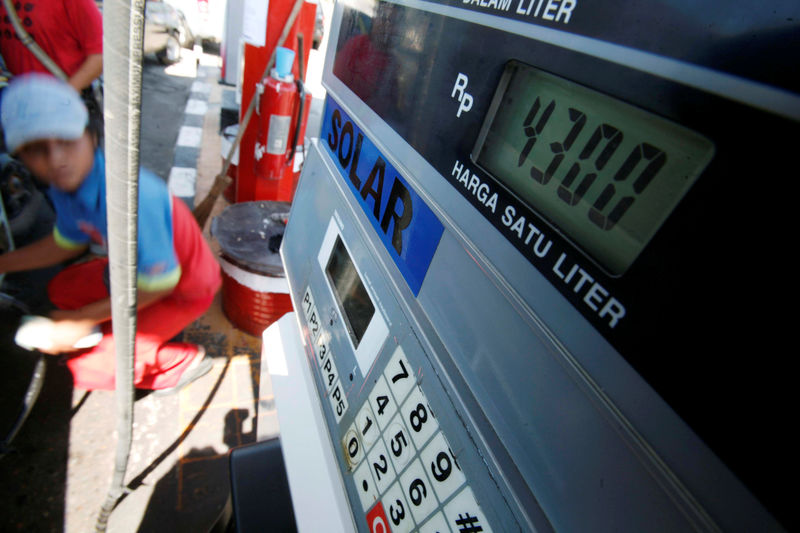By Fransiska Nangoy and Fergus Jensen
JAKARTA (Reuters) - Indonesia plans to require all diesel fuel used in the country contain biodiesel starting next month to boost palm oil consumption, slash fuel imports, and narrow a yawning current account gap.
While the proposal has been welcomed by the palm oil industry and government, it has raised concerns among the automobile industry the fuel could impact engine performance.
Environmentalists fear the boost to local palm oil consumption will hasten Indonesia's already fast spreading deforestation.
The following explains some of the issues surrounding the drive to increase biodiesel usage.
For a graphic on Indonesian oil imports, click https://reut.rs/2vfmzan
CURRENT ACCOUNT
Indonesia currently imports around 400,000 barrels per day of crude oil and a roughly similar amount of refined products, which makes Southeast Asia's largest economy vulnerable to the sort of increases in global crude prices seen over the past year.
With the current account deficit estimated to grow by $8 billion in 2018, the plan is to cut diesel imports by mandating that all diesel consumers, including power plants and railways, use biodiesel that contains 20 percent bio-content (B20), typically palm oil. Officials estimate this will save Indonesia around $6 billion per year.
For a related graphic, click https://reut.rs/2LQFfHZ
The program will increase domestic consumption of palm oil in the world's largest producer of the edible oil, providing a market for output that has climbed by 35 percent over the past five years.
FAME
In Indonesia, the bio component in biodiesel consists of fatty acid methyl esters (FAME) made from palm oil.
Indonesia has 26 FAME producers, including units of palm oil giants like Sinar Mas Group, Wilmar (SI:WLIL), and Musim Mas, according to the Indonesian Biofuels Producers Association (APROBI).
FAME is supplied to fuel distributors including Pertamina, blended with petroleum-based diesel and sold to end-users.
For a graphic on Indonesia's energy sector, click https://reut.rs/2Mc915Y
Currently only around one-quarter of Indonesia's FAME production capacity is utilized, and the new program could raise this to up to 50 percent, said Togar Sitanggang, a senior official at the Indonesia Palm Oil Association (GAPKI).
The government has said it will provide incentives to biodiesel producers, but has not provided details.
COMPATIBILITY
Efforts to increase FAME concentrations in biodiesel have faced resistance from regulators and the automotive and oil industries in the past.
Indonesia is supporting a program to make 100-percent palm oil-based biodiesel without FAME.
Rules introduced in 2015 make B20 mandatory in subsidized biodiesel up to January 2020, after which B30 is scheduled to become mandatory.
While B20 use is generally accepted for new vehicles, higher FAME blends may pose problems. FAME has a solvent effect that can corrode engine seals and gaskets, potentially increasing maintenance costs, and requiring special handling and equipment.
"High-level biodiesel blends can also impact engine warranties, gel in cold temperatures, and may present unique storage issues," the U.S. Department of Energy's Alternative Fuels Data Center (AFDC) said on its website.
For a related graphic, click https://reut.rs/2O5MHeM
According to the AFDC, the more FAME there is above 20 percent in biodiesel, the lower its energy content. FAME use could also increase nitrogen oxide emissions, although it greatly reduces other toxic emissions, it said.
In a 2016 assessment, the Japan Automobile Manufacturers Association (JAMA) concluded that biodiesel with no more than 20 percent FAME content was acceptable for vehicles that comply with the Euro IV emissions standard, among other conditions.
40,000 KM TEST
In a 2015 study by Indonesia's Technology Assessment and Application Agency (BPPT), six passenger vehicles from three manufacturers were driven over 40,000 km (25,000 miles) using B20 biodiesel and regular diesel.
The test found that B20 improved vehicle performance and acceleration, and reduced emissions, but the vehicles consumed roughly 4 percent more fuel than vehicles using regular diesel.
Tatang Soerawidjaja, chairman of the Indonesian Association of Bioenergy Scientists and Technologists, said extensive tests have shown that B20 poses "no problems" for diesel engines, even in older models.
Filters would only need replacement or more frequent cleaning in the early phase of adopting biodiesel use, he said, referring to FAME's solvent effect when mixed with regular diesel.

"The bio content cleans dirt off of the tank's walls and pipes, and this ends up in the filter," he said.